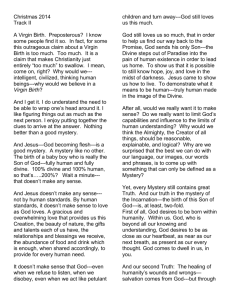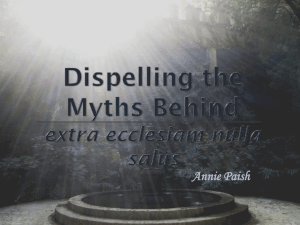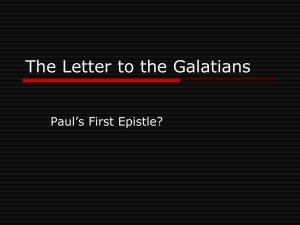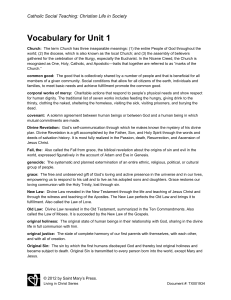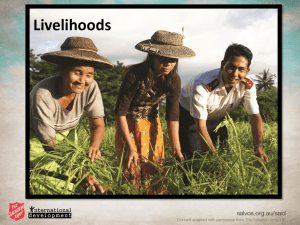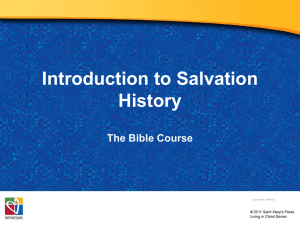Bible Study from the Revd Kate Gray
advertisement
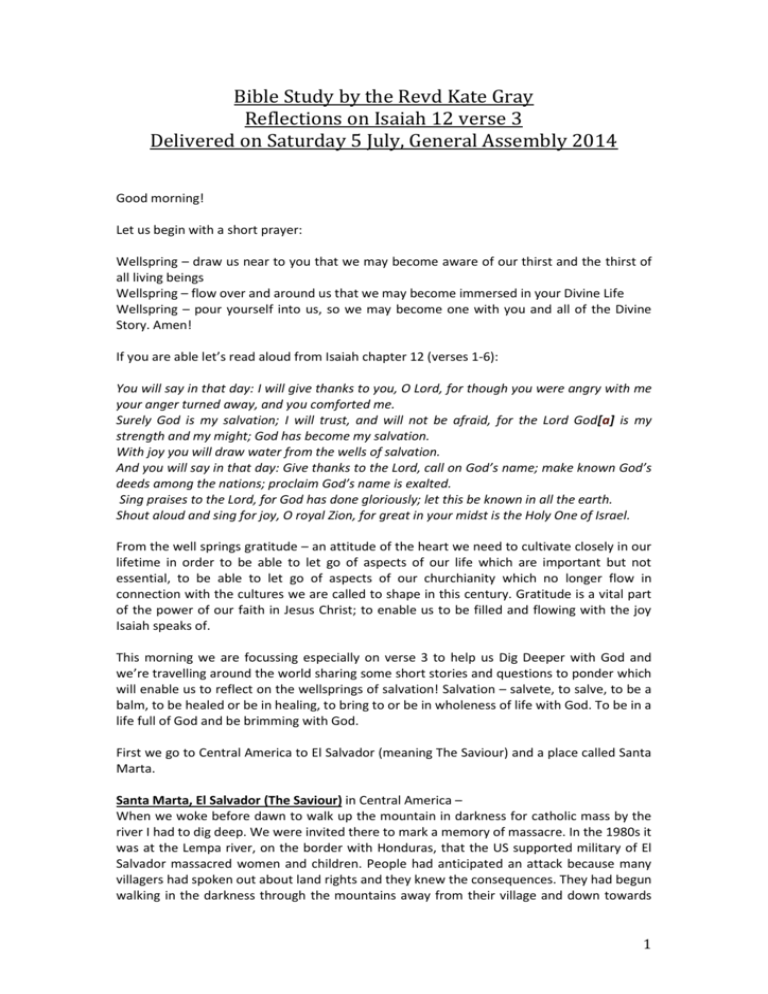
Bible Study by the Revd Kate Gray Reflections on Isaiah 12 verse 3 Delivered on Saturday 5 July, General Assembly 2014 Good morning! Let us begin with a short prayer: Wellspring – draw us near to you that we may become aware of our thirst and the thirst of all living beings Wellspring – flow over and around us that we may become immersed in your Divine Life Wellspring – pour yourself into us, so we may become one with you and all of the Divine Story. Amen! If you are able let’s read aloud from Isaiah chapter 12 (verses 1-6): You will say in that day: I will give thanks to you, O Lord, for though you were angry with me your anger turned away, and you comforted me. Surely God is my salvation; I will trust, and will not be afraid, for the Lord God[a] is my strength and my might; God has become my salvation. With joy you will draw water from the wells of salvation. And you will say in that day: Give thanks to the Lord, call on God’s name; make known God’s deeds among the nations; proclaim God’s name is exalted. Sing praises to the Lord, for God has done gloriously; let this be known in all the earth. Shout aloud and sing for joy, O royal Zion, for great in your midst is the Holy One of Israel. From the well springs gratitude – an attitude of the heart we need to cultivate closely in our lifetime in order to be able to let go of aspects of our life which are important but not essential, to be able to let go of aspects of our churchianity which no longer flow in connection with the cultures we are called to shape in this century. Gratitude is a vital part of the power of our faith in Jesus Christ; to enable us to be filled and flowing with the joy Isaiah speaks of. This morning we are focussing especially on verse 3 to help us Dig Deeper with God and we’re travelling around the world sharing some short stories and questions to ponder which will enable us to reflect on the wellsprings of salvation! Salvation – salvete, to salve, to be a balm, to be healed or be in healing, to bring to or be in wholeness of life with God. To be in a life full of God and be brimming with God. First we go to Central America to El Salvador (meaning The Saviour) and a place called Santa Marta. Santa Marta, El Salvador (The Saviour) in Central America – When we woke before dawn to walk up the mountain in darkness for catholic mass by the river I had to dig deep. We were invited there to mark a memory of massacre. In the 1980s it was at the Lempa river, on the border with Honduras, that the US supported military of El Salvador massacred women and children. People had anticipated an attack because many villagers had spoken out about land rights and they knew the consequences. They had begun walking in the darkness through the mountains away from their village and down towards 1 the River. There those who could swim went across and began to form a human bridge across the waters for others to cross. The military went upriver and blew up the nearby dam and flooded the riverbed drowning hundreds. Others were massacred at the waters edge. It was a time of terror. The river of life ran with blood. (pause) Some were alive in Honduras and stayed in a refugee camp. (pause) It was a powerful communion we shared when over 2 decades later Santa Martans returned for the first time from Honduras and walked into their village. We were witnesses to part of their healing journey with many tears and huge joy. I offered my heart and ears but beyond that I had no idea what to pray. I felt as if I had no well to draw from and I did not know what salvation was – God did not save people there – I cannot believe God saved some and not others – what kind of God and selective salvation is that? (pause) God was at the mountainside and riverside massacre, God grieved with the mourners, God waited in the refugee camps and Gods waters were bloodied. Their sufferings have become part of mine in a small way but a large part of my well of salvation. When I break bread I often pray for the people, the land and waters of El Salvador. I have been inspired by a book by the liberation theologian Gustavo Gutierrez – We Drink from Our Own Wells I would like you to think for 2-3 minutes about these questions: 1. Can you find some water of life/salvation in this story? Where is it? 2. Recall a time in your life when your well (of salvation/saltiness for good) has been full and a time when your well (of salvation/saltiness for good) has been empty and show gratitude to God for these times. 3. Now I would like you to become aware of your own well of salvation – does it need topping up, deeper prayer, silence, healing in relationship to someone, to be nearer our Source – the Spirit? We carry this observation in our explorations and invite the Spirit of God to minister to us. In Isaiah 12 the Source of the well is the Wellspring and it is Divine. Water is life and those who don’t have water know the value of it. Wells were, and still are, vital for life and hard work to draw from. Imagine if we valued the wellspring of salvation as much as the writer of Isaiah…both are as vital for us for life in Christ in the power of the Spirit. We could say we are to draw on these waters with joy and that may require digging deep. Something of value is not always found on the surface. It is to be part of the landscape of our soul – these wells of salvation spoken of in Isaiah 12 I think need to be part of our inner life and outer life. This multitude of wells of salvation reminds me of the verse ‘in my Fathers house there are many rooms’ and of the space there is in God’s Grace, there is a depth and broadness beyond our comprehension and often our comfortable salvation. Next we go to Zambia in Africa Water from a well comes from deep within the earth. Salvation from the many wells is at the heart of the Divine. Underneath there are waters to be discovered which are life-giving. 2 In the Manchester-Zambia charity I work for we sank our first well a couple of years ago, not without vast challenges. The groundwater was said to be poisonous because of the nearby mining over years by British and Chinese companies. Clear and clean water was there in the ground but we could not easily access it. Those who sank the well ignored complaints for months before they were recalled to repair the well. There were 3 villages with no well and no school for over 400 primary age children. A teacher, Angela Nuze, took it upon herself to pursue the company relentlessly until they returned and repaired what they should. She was so moved by the children of the villages in their longing for education she quit her well-paid job and started a school under the shade of a mango tree where it grew for 12 months. In that time she was the sole teacher and organised with villagers to gather resources to build the first 3 classrooms. She would not be stopped because of dirty water and her determination has meant that the school has flourished within 2 years has become a government registered funded school with qualified teachers, washing and toilet facilities, an orchard of 100 fruit trees, a large vegetable garden able to feed 300 people! Abundant life comes from Living waters! Some things I learn from this story in connection with our Isaiah 12: 1. Joy is a choice and needs to be cultivated in tough circumstances. Joy is part of salvation. Where there is no water people perish, where there is no joy people also perish although they may be breathing. so joy, elation, requires determination and focus. 2. The voice in Isaiah observes anger which is transformed and there is no fear where trust is present. So for Angela Nzuze I learn too that the voice of one connected to many can build trust and new vision where people were perishing. She had to dig deep to find those resources and so do we. 3. The purpose of the well is for water. The water has many purposes – washing, refreshing thirst, watering trees and vegetables, increasing health, baptism bringing life where there was death. The waters of salvation are for to be offered to all peoples everywhere – for the healing of the nations, for the salvete – for the saltiness of Good News of Jesus the Christ to reach everyone. This call requires everything of us and we need a deep well to draw from when we can no longer feel joy, see hope or envision a future for parts of our communities or world. The water which slips through our fingers is also for us as well as for others. I want us to ponder these questions: 1. Are we awake to those around us who long for joy? Who are they specifically? Do we know them by name? How can we be bearers of joy and elation specifically where God has planted us? 2. Do we see in ourselves a longing and a focus for the bubbling up of the Divine Spirit in our daily lives/in our communities for others? What does that look like in a picture to you ie what do/might/could the waters of salvation look like where you live/volunteer/worship? 3. Whom are the people we observe filled with joy? Who are they? What are their daily spiritual practices? How do they live and what can we learn from their lives? Name one now. Decide to seek them out by spending time with them. The presence of such inspiration in our lives helps us to dig deeper. Share some thoughts with your neighbours next to you for 5 mins in total. 3 4. How much do we observe the thirst or longing of others for the Divine Wellspring of Life? Does this shape our faith and our church? Our last stop is here in Wales It’s said there are about 2000 wells in Wales. Two famous ones: The most visited well in Wales is St Winifred’s Well in Holy Well, North Wales, near where I was brought up. It is also houses a hospice, a threshold of healing, and is a site of pilgrimage for thousands. Another is St Non’s Well in Pembrokeshire here in South Wales. At St. Nons there is a story that when Non gave birth to David (the patron Saint of Wales) a spring began to flow up from the earth and there is a chapel on that site on the hilltop. A well is about life from the source. as in Isaiah 12 it is ancient touching place with a holy source both for ourselves but also for giving away and sharing with others, a pathway and connection to other times and places, a place of encounter with something touchable which slips through our fingers …like the Divine Life, water cannot always be contained. It seeps into the earth, it is multitude, it bubbles up, flows down and spills over. So it may be with the hard and joyful work of drawing up from the wells of our salvation. It is found fully but not solely in Jesus Christ. The Waters of the earth, mother earth, may be for us our first monastery in which we are supported and held in the womb, birthed, bathed or baptised. The Monastery, if we are born of the Holy Spirit, is the first place we are schooled in the Divine Life on mother earth as a child. Spaces deep within us. It is to these places, which are full of the wildness of the Divine Waters and cannot be tamed, that we dig deep and draw up from – the waters of salvation are from the Divine around and within and in Christ…The Well is Christ, unbound, welling up from within, immersing us, reminding us of baptism, of deep wells of grace and forgiveness and spaces which cannot be filled up with clutter but are to draw from in silence, stillness, wonder and delight. The flow of the Divine Life is such. It is movement, flow, liquid and this is the kind of call to us from this part of the Old Testament. One which is a wellspring giving life to all, no matter what. It is one which should move our faith, speak to our salvation, minister to our imagination and to the landscape of the soul. As we move through the business of Assembly may the Wellspring from which we draw deeply shape and inspire us. May we take from this reflection what we need from our Source. Amen. ends 4
